
The Parades (2024): A Poignant Exploration of Loss and Connection
"The Parades," directed by Michihito Fujii, takes viewers on a heartfelt journey through the afterlife, exploring themes of love, loss, and the power of human connection. The story follows Minako, a mother searching for her son after a devastating calamity, who gradually comes to terms with her own passing and finds herself in a realm of restless spirits.Strengths:
⪼ Emotional resonance: The film excels at capturing the profound emotions associated with loss and grief. Minako's unwavering love for her son and the struggles of other characters to find closure resonate deeply with viewers.
⪼ Unique portrayal of the afterlife: The film's portrayal of the afterlife, with its "parades" where the deceased search for the living, is both visually stunning and thought-provoking. It creates a space for exploring unresolved relationships and the lingering bonds between life and death.
⪼ Compelling characters: Each character in the film, from Minako to the other residents of the in-between world, has their own unique story and motivations. This adds depth and complexity to the narrative.
Weaknesses:
⪼ Uneven pacing: The film occasionally struggles with pacing, with some scenes feeling rushed while others linger too long. This can disrupt the emotional flow of the story.
⪼ Light on plot: While the film excels in its emotional core, the overall plot remains relatively simple. Viewers seeking a more complex narrative may find themselves wanting more.
Overall:
"The Parades" is a visually stunning and emotionally resonant film that explores universal themes of love, loss, and the power of connection. While the pacing and plot could be tighter, the film's strengths lie in its heartfelt portrayal of grief and its unique depiction of the afterlife. It is a film that will stay with viewers long after the credits roll, prompting reflection on life, death, and the bonds we forge with others.
Recommendation:
This film is a good choice for viewers who enjoy emotional dramas with supernatural elements and who are interested in exploring themes of loss and the afterlife. However, those seeking a fast-paced plot with multiple twists may find it lacking.
Esta resenha foi útil para você?

Pachinko - An Epic Historical Saga
Historical epics aren't a new concept. Neither are multigenerational family dramas or period pieces. We've all seen them: programs with meticulously preserved and historically correct set architecture; intergenerational family dramas in which the youngest generation learns about their ancestors and gains a new perspective on themselves; and stories of enslavement, torture, perseverance, and struggle. Pachinko, the newest drama on Apple TV Plus, manages to take all of these tropes and polish them into something incredibly particular and new: a Korean family epic.We observe the horrors of Japanese occupation through Sunja's eyes. She watches as a kid the arbitrary violence of Japanese police who arrest any Korean accused of speaking out against their occupiers. She is the victim of a racist attack as a teenager in the 1930s (the primary timeframe of the program), and subsequently, after moving to Japan, she and her family live as second-class residents. There's no sugarcoating the history of colonization and conflict between Korea and Japan because of personalities like Koh Hansu (Lee Min-Ho). Koh Hansu's obvious commitment to Japan makes him neither good nor wicked; rather, the way he treats Sunja is the ultimate litmus test of his character.
Pachinko, on the other hand, is motivated not by Sunja's anguish, but by her tenacity in the face of it. Pachinko regularly avoids straying into trauma porn; it's evident that showrunner Soo Hugh recognizes the historical significance of how Sunja's narrative fits within the horrors of the Japanese occupation, but they also recognize that focusing on her misery would obliterate the humanity of her story. Rather of utilizing Sunja to convey a tale about the occupation, Pachinko leans into this being her story, letting her journey to choose how much historical background is provided.
The experience of an immigrant who goes to a country where she doesn't know the language and is viewed as a second-class citizen is not the same as that of a second-generation guy who battles to reconcile his Japanese and Korean identities. They don't have to be.
Esta resenha foi útil para você?
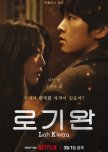
My Name is Loh Kiwan: A Heartfelt Journey of Hope and Identity
Released in March 2024, "My Name is Loh Kiwan" is a poignant drama film that navigates the complexities of seeking asylum through the lens of Loh Ki-wan, a North Korean defector grappling with life in Belgium. Played with remarkable depth by Song Joong-ki, Ki-wan confronts the unfamiliarity of customs, language barriers, and the bureaucratic labyrinth of refugee status. The film transcends a mere portrayal of cultural adaptation, weaving a tapestry of emotions as Ki-wan yearns for a new life while cherishing the memories of his homeland.Writer and director Kim Hee-jin masterfully crafts a narrative that resonates on multiple levels. Beyond Ki-wan's individual struggles, the film sheds light on the broader societal challenges faced by refugees. The emotional toll of displacement, the anxieties of navigating an unfamiliar legal system, and the longing for acceptance in a new community are depicted with sensitivity and nuance, prompting viewers to contemplate the human cost of political and societal divisions.
Ki-wan's journey is not one of solitude. His path unexpectedly intersects with Marie, a Korean woman residing in Belgium, portrayed with compelling complexity by Choi Sung-eun. Their contrasting perspectives - Ki-wan's hopeful pursuit of a future and Marie's struggle to overcome past traumas - create a captivating dynamic that fuels the narrative. Through their interactions, a unique bond blossoms, offering each character a chance to find solace and rediscover their strength.
The film's emotional core lies in its unwavering honesty. It doesn't shy away from depicting the harsh realities faced by refugees, showcasing the challenges of adapting to new cultural norms and the constant fight for basic rights. The performances by Song Joong-ki and Choi Sung-eun are exceptional. Song delivers a nuanced portrayal of Ki-wan, capturing both his unwavering resilience and the profound emotional vulnerability that arises from loss and displacement. Choi embodies the complexities of Marie's character, showcasing her inner turmoil and gradual path towards healing.
"My Name is Loh Kiwan" transcends the boundaries of a conventional refugee story. It delves into the depths of human emotions, exploring themes of identity, hope, and the transformative power of connection. This is a film that lingers in your thoughts long after the credits roll, leaving you with a renewed appreciation for the power of hope and the importance of empathy in an increasingly divided world.
Esta resenha foi útil para você?
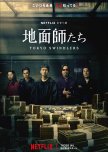
Tokyo Swindlers: A Thrilling Ride Through the World of Deception
Jimenshitachi, also known as Tokyo Swindlers, is a high-octane Netflix series that plunges you into the glamorous yet cutthroat world of real estate scams. It's a rollercoaster ride of deception, where a group of cunning individuals orchestrate elaborate schemes to pull off the ultimate heist. The show masterfully blends thrilling action with intricate plot twists, keeping viewers hooked from start to finish.What sets Tokyo Swindlers apart is its compelling characters. You'll find yourself both rooting for and questioning the morality of these complex individuals as they navigate a dangerous game of cat and mouse with the authorities. The series also delves into the psychological aspects of deception, exploring the motivations and consequences of their actions.
If you're a fan of crime dramas with a healthy dose of suspense and intrigue, Tokyo Swindlers is definitely worth a watch. Just be prepared to have your mind blown by the clever scams and unexpected plot developments.
Esta resenha foi útil para você?
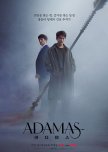
Adamas - The Disney+ High-Society Drama
◆ A mysterious title and stylish aesthetic initially intrigued Adamas, but the prop on which the entire show is based doesn't really serve any narrative purpose.◆ The highlight of the series is its mystery narrative, but it abandons this in favor of tedious action sequences, then barrels to a conclusion without resolution.
When it opened in late July, the high-society action-thriller Adamas captivated us with its intriguing setup and mysterious title.
In the show, Adamas inherits a diamond-encrusted arrow from Haesong Group chairman Kwon Jae-kyu (Lee Kyung-young) that turns out to be the weapon used in a murder. The victim is the father of twin brothers Ha Woo-shin - an author - and Song Soo-hyun - a prosecutor. Both brothers are played by The Devil Judge star "Ji Sung".
"Adamas" is a Greek word meaning invincible or indestructible. It is also the origin of the word diamond. Given Chairman Kwon's extravagant hype, Adamas seems a fitting emblem for his empire. However, Kwon's iron grip on power gradually begins to slip throughout the series – becoming an even stronger symbol, as we discover that the Adamas in his possession is actually a fake.
But beyond its intriguing symbolism, Adamas is a frustrating prop. Woo-shin's motive for infiltrating Kwon's compound is to reclaim it and solve his father's murder once and for all, which is given great importance in the plot.
The Gem Arrow is also being pursued by the Special Investigation Headquarters (SIH), a secret government organization trying to take down the Haesong conglomerate. But in both cases, it's unclear how its discovery actually supports their goals.
Mystery can only take you so far, and while Adamas can be a symbolic MacGuffin to bring us into the story, ultimately the show becomes so reliant on this extravaganza that it undermines the narrative.
In keeping with Adamas’s highfalutin feel, the series’ namesake isn’t the only classical reference in the story.
Woo-shin's best-selling novel is called "Persona non grata", the Latin term for "someone who is not accepted". Appropriately, Woo-shin and his search for Adamas are unacceptable to the Chairman's house.
Adamas works best as a mystery, which means that the half of the story where Haesong is helmeting Woo-shin around the closed halls was the most compelling part of the story.
On the other hand, Soo-hyun's outside investigations and eventual dealings with SIH and Haesong's "Team A" mercenary group are dominated by action and suspense. Things quickly escalate, and throughout the latter half of the series, explosions and fires become increasingly common.
This includes Team A acolyte Yoon Sun (Park Hye-eun), a psychotic and hypocritical killer who poisons and tortures. We learn that she is the sister of Chairman Kwon's mute secretary Yoon Jin (Lee Si-won), who is the secret lover of Kwon's heir, Hyun-jo (Seo Hyun-woo).
Yoon Sun despises her sister and shares some kind of dark background with her, but it's never really explained where they came from or why they enjoy such unfettered access to the most powerful corporation in the country.
After Haesong's grand 80th anniversary celebration coincides with a terrorist attack against SIH involving Soo-hyun's friend reporter Kim Seo-hee (Lee Soo-kyung), the balance of the dueling mystery-action narratives ends abruptly.
Woo-shin leaves the complex, and with him, do many of the most interesting aspects of the show. The action anthology rises, lining up in a tired gunfight parade. We also get a long sequence featuring the characters trapped inside a shipping container while those outside try to find them – which quickly becomes one of the most overused stock suspense scenes in Korean action dramas.
Secrets begin to emerge when Woo-shin and Soo-hyun join their birth father, Lee Chang-woo (Cho Seong-ha), who has escaped from prison. The trouble is, we already know or guess most of them.
As the season nears its end, characters begin to drop like flies, and another emerges as the true mastermind. But this flurry of activity leaves many threads unexplored and even obscures those that feel rushed and unsatisfying.
By the end of the finale, not much can be explained. Instead of neatly presenting us with any resolution, the show instead chooses to end on a boring season two cliffhanger.
Judging by the show's ratings, this second season is unlikely to work. What's more, the joke at this point feels like a gimmick for the show to avoid the narrative problems that have piled up throughout its 16 episodes.
Even as it continues, Adamas lacks a sense of catharsis at the end. The origins of several characters remain opaque and their motivations puzzling. Adamas eventually returns, but by then this iconic treasure has long since lost its luster.
Still many watchers like this drama because of its strong narrative & Ji Sung's acting.
Esta resenha foi útil para você?
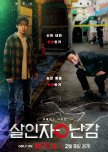
Justice at a Crossroads, Morality in the Balance
"A Killer Paradox" throws viewers into a world where chance encounters and fateful decisions lead down a perilous path of vigilante justice. Lee Tang, a down-on-his-luck college student, stumbles upon a mysterious artifact that grants him glimpses into alternate timelines. Driven by a thirst for justice and fueled by personal grievances, he manipulates these glimpses to expose the corrupt and powerful. But as lines blur and consequences mount, Tang grapples with the weight of his actions and the unintended ripple effects his interventions create.◆ Plot: A Web of Choices and Consequences: The narrative unfolds like an intricate puzzle, each decision Tang makes sending him down a different path with unforeseen outcomes. The absence of time travel eliminates the potential for repetitive loops and instead emphasizes the butterfly effect of his choices. This creates a constant sense of tension and uncertainty, keeping viewers guessing how each manipulation will play out. However, at times the complexity can be overwhelming, and the cause-and-effect relationships between Tang's actions and the resulting consequences aren't always fully explored.
◆ Characters: Morality in the Face of Fate: Lee Tang emerges as a flawed and complex protagonist. Choi Woo-shik delivers a captivating performance, showcasing Tang's internal struggle as he navigates the murky waters of vigilantism. The supporting cast is equally well-developed, each with its motivations and secrets that intertwine with Tang's journey. The enigmatic detective, the cunning villain, and even Tang's unwitting accomplices create a tapestry of characters that drive the narrative forward.
◆ Acting: Bringing the Paradox to Life: The talented cast breathes life into their characters. Choi Woo-shik masterfully portrays Tang's transformation from a disillusioned student to a determined vigilante, grappling with the weight of his choices. The supporting actors deliver equally compelling performances, adding depth and nuance to the narrative.
◆ Critical Analysis: Beyond Black and White Justice: "A Killer Paradox" transcends the typical vigilante narrative by delving into the complexities of morality and fate. The absence of time travel forces the story to confront the irreversible nature of consequences, challenging viewers to consider the ethical implications of Tang's actions. While the show doesn't shy away from portraying the emotional toll and potential dangers of vigilantism, it also raises questions about the limitations of the justice system and the societal forces that drive individuals to take matters into their own hands.
◆ In Conclusion: "A Killer Paradox" is a thought-provoking and suspenseful drama that challenges viewers to confront the complexities of fate, justice, and the consequences of our choices. While the absence might shift the focus, the show's strong performances, intricate plot, and exploration of moral dilemmas make it a rewarding watch for those seeking more than just a typical vigilante story.
Esta resenha foi útil para você?
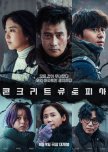
WE BELIEVE WE ARE CHOSEN
Human beings are selfish. Each & every one of them acts on their instincts. Doesn't matter if someone's life is at stake. The only matters is that if I can live my life. I don't care about someone else or a nobody.Being in a disaster, with no government to control the citizens, food, water, and shelter crisis arises. Some take on the throne to guide people from despair to hope. Some succeed, and some fail.
But nothing is easy. In the end, what eats us are our own minds. We don't know what to do, and for that, we go crazy. But hope still lives somewhere, we just have to find it & live with it.
Esta resenha foi útil para você?

Hard Days (2023): A Decent Thriller Overshadowed by its Source.
"Hard Days," a 2023 Japanese remake of the acclaimed 2014 South Korean film of the same name, is a decent crime thriller with some notable flaws. While it captures the core elements of the original - a down-on-his-luck detective embroiled in a web of corruption and desperate acts - it struggles to surpass its predecessor in several aspects.Strengths:
⪼ Engaging Premise: The film's central conflict, a detective's downward spiral after a hit-and-run accident, remains inherently captivating. The audience is constantly kept on edge as the protagonist makes increasingly poor decisions to cover his tracks.
⪼ Solid Performances: Junichi Okada delivers a committed performance as the beleaguered detective, Yuji Kudo, and Go Ayano is suitably menacing as his antagonist.
⪼ Well-Crafted Action: The action sequences are well-choreographed and brutal, adding to the film's intensity.
Weaknesses:
⪼ Unnecessary Length: At nearly two hours, the film feels bloated compared to the leaner original. This can lead to pacing issues and a sense of drag in some sections.
⪼ Overstuffed Plot: In an attempt to differentiate itself, the remake adds additional characters and subplots that feel unnecessary and muddy the narrative focus.
⪼ Lack of Originality: While competently made, "Hard Days" fails to bring anything new to the table compared to the original film. For viewers familiar with the 2014 version, this remake might feel redundant.
Overall:
"Hard Days" is a watchable crime thriller with a strong premise and solid performances. However, its excessive length, convoluted plot, and lack of originality compared to the superior source material hold it back from reaching its full potential. If you haven't seen the 2014 Korean film, "Hard Days" might offer a decent dose of suspense. However, for those seeking a more impactful and streamlined experience, the original remains the better choice.
Esta resenha foi útil para você?

One Percenter (2023): A Knockout Punch for Action Fans
One Percenter throws down the gauntlet to Hollywood's brand of action cinema. This 2023 Japanese film is a love letter to old-school, raw fight choreography and a hilarious takedown of the industry's reliance on CGI and shaky-cam.Toshiro Takuma, played by the legendary Tak Sakaguchi, is an action star yearning for authenticity. Disillusioned by the current state of action films, he sets out to make his dream project: a movie with bone-crunchingly realistic fight scenes inspired by samurai warriors. But achieving this vision requires him to break free from the industry's constraints.
Enter his devoted apprentice, Akira. Together, they escape to a remote island to film their masterpiece. However, their quest for realism takes an unexpected turn when yakuza thugs crash the set. The line between movie and reality blurs as Toshiro is forced to put his fighting skills to the ultimate test.
One Percenter isn't just about the action, though. It's a witty meta-commentary on the action genre. The film winks at fans with references to classic action tropes and even throws some playful shade at other action stars (think Jackie Chan). This self-awareness adds a layer of humor that keeps the film from becoming overly serious.
The real star of the show, however, is the fight choreography. Director Yudai Yamaguchi brings in the talents of Kensuke Sonomura, resulting in some of the most impressive and brutal fight sequences you'll see on screen. The action is balletic, brutal, and beautifully shot, with camerawork that allows you to appreciate every punch and kick.
One Percenter isn't without its flaws. The villains are a bit one-dimensional, and the ending, with its double twist, might feel a tad convoluted. However, these are minor quibbles in a film that delivers pure, unadulterated action movie fun.
If you're a fan of classic action films with a healthy dose of self-awareness, then One Percenter is a must-watch. Just be prepared to have your jaw drop at the fight choreography.
Esta resenha foi útil para você?
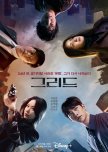
Disney+’s New Korean Mystery Drama, "Grid" Is a Must-Watch.
◆ Grid, starring Seo Kang-joon, Kim Ah-joong, and Lee Si-young, successfully constructs its apocalyptic future scenario in which Earth is threatened by massive solar flares.◆ A monotonous quest for a killer precedes the program, which abandons all logic in favor of time-traveling hijinks that undermine efforts at emotional moments.
Grid may not be generating as much social attention as the heartwarming rom com "Forecasting Love And Weather" or the tense zombie apocalypse thriller "All Of Us Are Dead". But believe us when we say you're losing out on a great show if you don't watch it right now. Why? We present our case below.
#01. The premise is extremely intriguing.
- In 1997, an enigmatic entity known only as Ghost (Lee Si-Young) devised the Grid system in order to preserve mankind from a devastating tragedy. After then, Ghost vanished. However, Ghost resurfaced 24 years later and assisted serial murderer Kim Ma-Nok (Kim Sung-Kyun) in escaping from jail. Kim Sae-Ha, played by Seo Kang Joon, attempts to discover the truth about Ghost. He eventually crosses encounters with other people who are also on the hunt for Ghost for various reasons.
Grid's take on a supernatural story is intriguing since, unlike other K-dramas of the same genre, the major supernatural entity in this story (Ghost) isn't presented as either 'good' or 'evil.' The plot's intrigue resides in Ghost's dubious motives in her job of 'saving' humanity. This makes every revelation about this character fascinating since each episode seems like a thrilling guessing game.
#02. An edge-of-your seat plot.
- The Grid is looking for an edge-of-the-seat audience when it premieres on February 16. The fast-paced, exciting world of K-drama centers around a group of hotshots chasing a mysterious figure known only as Ghost.
These individuals must work with a mysterious government organization to track down an elusive figure and uncover why, 24 years after the Grid system was created to protect the planet from the destructive solar winds, Ghost is now an accomplice to murder.
#03. The cinematography, scoring and overall feel of the drama make the viewing experience extremely immersive.
- Supernatural movies take a while to save money on special effects. But Grid's cinematography, score, and overall feel balance its use of CGI and effective storytelling to give viewers a better viewing experience.
For most of the scenes, the excitement comes from the intensity of the character acting and the way each scene is staged, edited and put into place horrific effects. The characters are also given enough room to grow into their own stories. This makes it easy for the audience to immerse themselves in the story without excessive flashbacks, major interruptions from narration and the like.
Grid is a great choice for those who want a break from zombie plots (which seems to be the trend in Asian dramas lately) but aren't clearly driven by the suspense-thriller genre.
#04. Award-winning Stranger writer "Lee Soo-Yeon" is behind Grid's story.
- If you enjoyed the 2020 suspense thriller "Stranger" starring Cho Seung-woo (Sisyphus: The Myth) and Bae Donna (Kingdom), as well as Lee Dong-wook's medical drama (Goblin, Touch Your Heart), then you'll want to be thrilled by the drama's writer., Lee Soo-yeon, is also behind the screenplay for Grid. Her ability to create exciting storylines that still tug at the heartstrings earned her recognition at the 54th Baeksang Arts Awards.
Esta resenha foi útil para você?

Giant God Warrior Appears in Tokyo
0 pessoas acharam esta resenha útil
Esta resenha pode conter spoilers
This World has a Finite life
If you have 10 minutes just watch this, it won't ruin your time.The VFX isn't quite good. The animation seems a bit of noticable. But no matter with that; as this short was created in 2012. You can imagine what kind of artists & softs would have been available at that time. So don't let the VFX run all over you.
But what I liked is the dialogues. It starts with a simple sister-brother conversations. Then all the destructions starts. At 7 minutes everything becomes so much understandable.
Just watch this. Couldn't write more, as the short itself is 10 minutes what else should I write?
Esta resenha foi útil para você?


 1
1






















